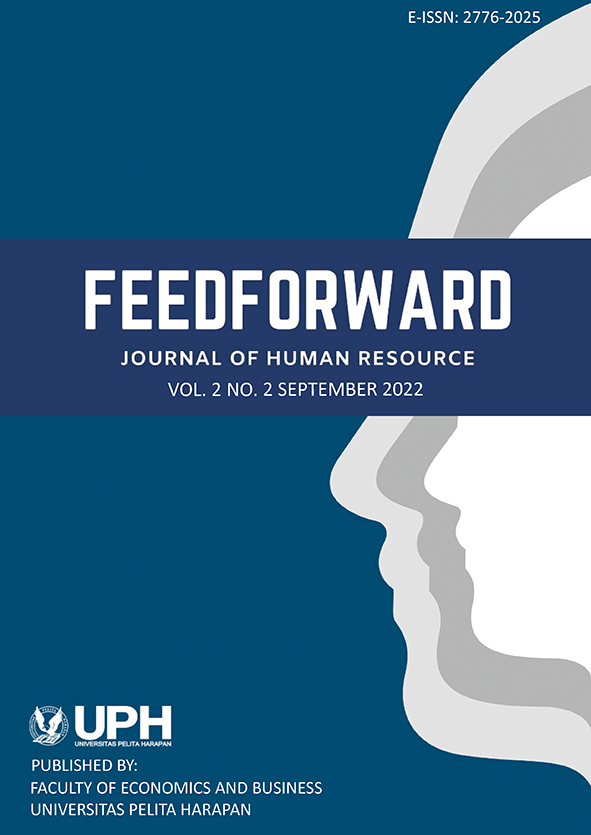Analisis Sistem Reward dan Punishment untuk Meningkatkan Motivasi Kerja dan Organizational Commitment Karyawan dengan Studi Kasus Pada PT XYZ [Analysis of Reward and Punishment to Increase Work Motivation and Organizational Commitment of Employees at XYZ Company]
DOI:
https://doi.org/10.19166/ff.v2i2.6007Keywords:
Reward, Punishment, Organizational Commitment, Employee Empowerment, Employee Engagement, Motivasi, Kinerja, Motivation, PerformanceAbstract
This study aims to determine the effect of reward and punishment on work motivation and organizational commitment of employees at PT XYZ company. This study uses quantitative methods and non-probability sampling techniques, where samples taken using purposive sampling totalling 130 employees. Data was collected using a questionnaire with a Likert scale which was then analyzed using the Partial Least Squares - Structural Equation Modeling (PLS-SEM) technique on SmartPLS 3.0 software. The results of the study prove that organizational commitment has no effect on employee motivation and performance, while employee empowerment and reward and punishment have a positive influence on employee motivation and performance. The importance of implementing employee empowerment and reward and punishment will create a high level of motivation and performance for employees if it is carried out according to employee expectations.
Bahasa Indonesia Abstrak: Penelitian ini bertujuan untuk mengetahui pengaruh reward dan punishment terhadap motivasi kerja dan komitmen organisasi karyawan pada perusahaan PT XYZ. Penelitian ini menggunakan metode kuantitatif dan teknik non-probability sampling, di mana sampel yang diambil menggunakan purposive sampling yang berjumlah 130 karyawan. Pengumpulan data dilakukan menggunakan kuesioner dengan skala Likert yang kemudian dianalisis menggunakan teknik Partial Least Squares - Structural Equation Modeling (PLS-SEM) pada software SmartPLS 3.0. Hasil penelitian membuktikan bahwa komitmen organisasi tidak berpengaruh terhadap motivasi dan kinerja karyawan, sedangkan employee empowerment serta reward dan punishment memiliki pengaruh positif terhadap motivasi dan kinerja karyawan. Pentingnya implementasi employee empowerment dan reward dan punishment akan menciptakan tingkat motivasi dan kinerja yang tinggi terhadap karyawan jika dilakukan sesuai harapan karyawan.
References
Aguinis, H. (2013). Performance management (3rd ed.). Pearson.
Ahmadi, H. A., & Supriyono, W. (2013). Psikologi belajar. Rineka Cipta.
Cohen, R., & Kennedy, P. (2013). Global sociology. NYU Press.
Dessler, G. (2020). Human resource management (16th ed.). Pearson.
Firmansyah, M. R., Setyadi, S., & Sumarsono, T. G. (2021). The effect of reward and punishment on employee performance through work motivation in PT Haleyora Power, zone 1 and zone 2 in Pasuruan area. International Journal of Scientific & Technology Research, 10(6), 166-169.
Hair, J. F., Jr., Anderson, R. E., Tatham, R. L., & Black, W. C. (2010). Multivariate data analyses with readings. Engelwood Cliffs.
Handoko, T. H. (2002). Manajemen personalia dan sumber daya manusia. BPFE.
Ivancevich, J. M., Konopaske, R., & Matteson, M. T. (2006). Perilaku dan manajemen organisasi. Erlangga.
Kinicki, A., & Fugate, M. (2018). Organizational behavior: A practical, problem-solving approach (2nd ed.). McGraw-Hill Education.
Latief, B. (2012). Faktor-faktor yang mempengaruhi kinerja karyawan PT Mega Mulia Servindo di Makasar. Jurnal Manajemen dan Akuntansi, 1(2), 61-70.
Lewiuci, P. G., & Mustamu, R. H. (2016). Pengaruh employee engagement terhadap kinerja karyawan pada perusahaan keluarga produsen senapan angin. AGORA, 4(2), 101-107.
Mangkunegara, A. A. A. P. (2017). Manajemen sumber daya manusia perusahaan, cetakan ketiga. Rosdakarya.
Mathis, R. L., & Jackson, J. H. (2016). Human resource management (13th ed.). South-Western Cengage Learning.
Meyer, J. P., & Allen, N. J. (1997). Commitment in the workplace: Theory, research, and application. Sage.
Nugrahaningsih, R., Setyadi, D., Mintarti, S., Rochaida, E., Suharto, R. B., Faturrahman., & Awaluddin, M. (2021). Effect of organizational commitment and employee empowerment and reward and punishment of motivational BPJS services and performance of employees in Hospital Abdul Wahab Sjahranie Samarinda, Indonesia. Turkish Journal of Computer and Mathematics Education, 12(13), 4301-4314. https://turcomat.org/index.php/turkbilmat/article/view/9447/
Pinder, C. C. (2013). Work motivation: Theory, issues and applications. Scoff, Foresmen and Company.
Purwanto, M. N. (2006). Ilmu pendidikan: Teoritis dan praktis. Remaja Rosdakarya.
Robbins, S. P., & Judge, T. A. (2017). Organizational behavior. Pearson Education.
Sardiman, A. M. (2011). Interaksi dan motivasi belajar mengajar. Rajawali Pers.
Shields, J., & Rooney, J. (2017). Reward management. In J. Syed & R. Kramar (Eds.), Human resource management: A global and critical perspective (2nd ed.). Palgrave Macmillan UK.
Sugiyono. (2015). Metode penelitian pendidikan (Pendekatan kuantitatif, kualitatif, dan R&D). CV Alfabeta.
Wiyani, A. N. (2013). Manajemen Kelas. Ar-Ruzz Media.
Downloads
Published
Issue
Section
License
Authors who publish with this journal agree to the following terms:
1) Authors retain copyright and grant the journal right of first publication with the work simultaneously licensed under a Creative Commons Attribution License (CC-BY-SA 4.0) that allows others to share the work with an acknowledgement of the work's authorship and initial publication in this journal.
2) Authors are able to enter into separate, additional contractual arrangements for the non-exclusive distribution of the journal's published version of the work (e.g., post it to an institutional repository or publish it in a book), with an acknowledgement of its initial publication in this journal.
3) Authors are permitted and encouraged to post their work online (e.g., in institutional repositories or on their website). The final published PDF should be used and bibliographic details that credit the publication in this journal should be included.


